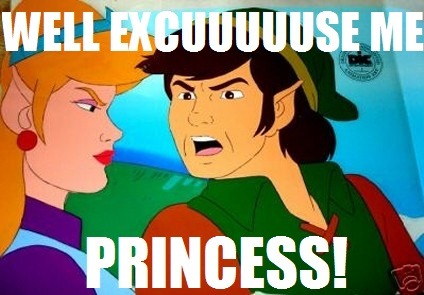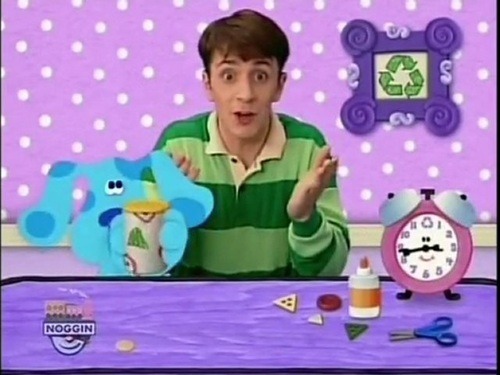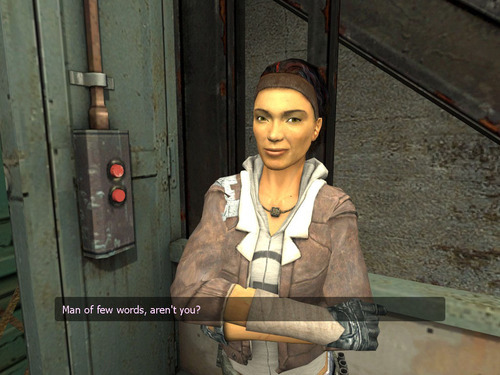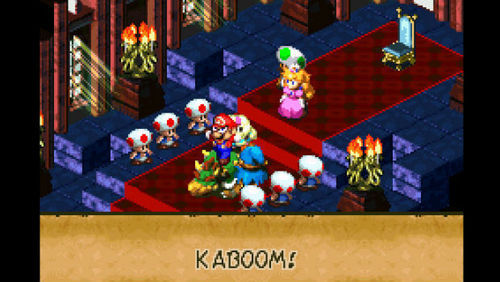Trending
Opinion: How will Project 2025 impact game developers?
The Heritage Foundation's manifesto for the possible next administration could do great harm to many, including large portions of the game development community.

Featured Blog | This community-written post highlights the best of what the game industry has to offer. Read more like it on the Game Developer Blogs or learn how to Submit Your Own Blog Post
The Silent Protagonist is a very weird convention in video games, lets talk about it.

Persona Q lets you choose between 2 different main characters, you can be either the protagonist from Persona 3 or 4. This doesn't seem like a big deal on account of the fact that neither talk in their respective games, both are silent protagonists, blank slates.
The thing is though eventually while playing though Persona Q you meet the one you didn't pick and they talk. Not just talk though, they joke around, they have emotions and everything, like people! This begs the question then, if this is how they act when you aren't looking at things from their perspective, is this how they always act? Is this in fact how the one you are in control of is acting right now and you just don't get to see it?
Before we launch into that though, lets touch all the bases, what is a silent protagonist? A silent protagonist is when the main/player character doesn't talk. That isn't to say they are mute, or unable to communicate, just that we don't ever hear them talk. These are characters like Crono, Gordon Freeman, Mario, Link... the list is endless.

Link did get to talk briefly, but only for the television show. It was terrible, I desperately hope that he becomes canonically and permanently mute.
The reason this is done is to typically make it easier for the player to put themselves in the game via this character. To accomplish this they try and make the main character something of a blank slate so that it easier for the player to project themselves onto this rough outline of a character.
This concept isn't unique to games, books and movies will often make the main character purposefully bland and without strong characteristics so that the audience has an easier time projecting themselves into the world the story is trying to create via this character (and then give the side characters all those interesting personality traits that make it hard for the viewer/player to imagine themselves as that particular character). So while the concept isn't unique to games, games though have a history of taking this concept to the extreme by making the main character never talk in order to ensure they don't ever say something that the player might not say.

The silent protagonist, or at least a form of it actually does exist in television, and it is actually fairly common in children's television. For instance in Blue's Clues the character Steve will ask the viewer questions and leave enough silence for the viewer to respond. The viewer is a character in the show (they are asked questions, they 'give' input) even though they don't speak (kinda, I mean it will have other children's voices representing other viewers, another attempt to get kids to respond by trying to normalize responding) in an attempt to get the viewer more engaged in and responsive to the show.
It is the television version of the silent protagonist.
Again though, it isn't as though the silent protagonist is actually mute. It would seem that based on how people talk to the silent protagonist that they are actually talking and we just can't hear them. People ask them questions (that the player doesn't hear answered), people appear to get information from them, look to them for leadership and guidance, they even pause during conversations to let the silent protagonist talk.

Though games with silent protagonists do love throwing in the joke about how they "Don't talk much" no one the silent protagonist ever meets really has it explained to them that this person is mute, or asks why they aren't talking. Not being able to talk is one of those things people tend to notice and have follow up questions on, so the absence of people asking questions implies that the question doesn't need to be asked.
Is that because everyone already knows the character is mute or is it because the character isn't mute to them?
Persona Q seems to validate the idea that the character does talk and we just never get to hear it when we get to see what one of these silent protagonists acts like when they aren't burdened with "silent protagonist" status. They joke, they laugh, they cry, they do all sorts of things the player might not do. For all we know the one you are in control of is doing the exact same thing. The silent protagonist has to be one of gaming's weirdest conventions. Weirder then exploding chairs, multiple lives, or the ability to jump in the air is the frequency with which main characters in video games don't talk.
One character that has taken the concept of the silent protagonist to new and weirder levels is Mario. He has created a whole ascetic around never talking. Or actually several ascetics as different game series featuring him deal with the fact that he doesn't really talk differently (he does say "It's a me, Mario!", but that is just about all he ever says). In more recent Mario platformer titles (both 2D and 3D) the games seem to have extended this silence, making it so that nobody talks. At this point it isn't so much a silent protagonist as it is more like the protagonist is a completely normal member of a world inhabited entirely by mimes. Nintendo wouldn't make Mario normal by letting him talk to people, but they could make him contextually normal by making everyone else really weird and that is what they went with.
Mario RPG games though they are a bit more stuck on account of the fact that RPGs need more robust stories (Etrian Odyssey excluded). Mario platformers can keep having the story be that Bowser kidnapped someone and Mario has to rescue them, with the only plot points being different castles you have to go to and traverse. But for a more complicated story you need speech, and you need to let the non-Mario characters do exposition, develop the story, and provide character motivations. This leaves Mario stranded as the only non-speaking member of the game much like every other silent protagonist (well, sometimes also 'mute' Luigi tags along).
In these games though Mario isn't treated like every other silent protagonist, he isn't just a passive character who has everyone else do his talking for him, nor is his speech just implied but never heard. Mario does engage in communication just not speech. He will launch in to large acts of pantomime in order to explain the situation to other characters. RPG Mario's blankness is created by not letting him speak but it is then filled to the brim with unrelatable actions. This makes him much less of a blank slate than if he actually talked (which is usually the justification for having a silent protagonist) but it is really fun, so whatever I'm totally on board.

I really do love this version of Mario.
That is the thing about the silent protagonist though, even without talking they aren't completely blank. They still act, they still do things, and just because they don't have speaking lines doesn't mean they don't have personalities and character traits. Link for example is courageous, adventurous, and adaptable (he will use whatever he can find to accomplish his goals), we know this by his actions if not his words.
Even when you can make a choice for the character, the character is what sets the boundaries for that choice. You can choose from one of several things the character might do, not necessarily from a list of things the player might want to do. They are characters that get defined more by what they wouldn't do then by what they would do, they are a silhouette of a character for players to project themselves onto.
I'm not really complaining about the practice, plenty of games I love have silent protagonists and there are plenty of characters I love that are silent protagonists. I kinda like it in a weird way, it is an interesting peccadillo that pretty unique to games. I think all I really want is for everyone to take a second and acknowledge how monumentally weird it is.
Does that make sense?
Read more about:
Featured BlogsYou May Also Like